
ICAS Bulletin (online ISSN 2836-3418, print ISSN 2836-340X) is published every other week throughout the year at 1919 M St NW, Suite 310, Washington, DC 20036.
The online version of ICAS Bulletin can be found at chinaus-icas.org/bulletins/.
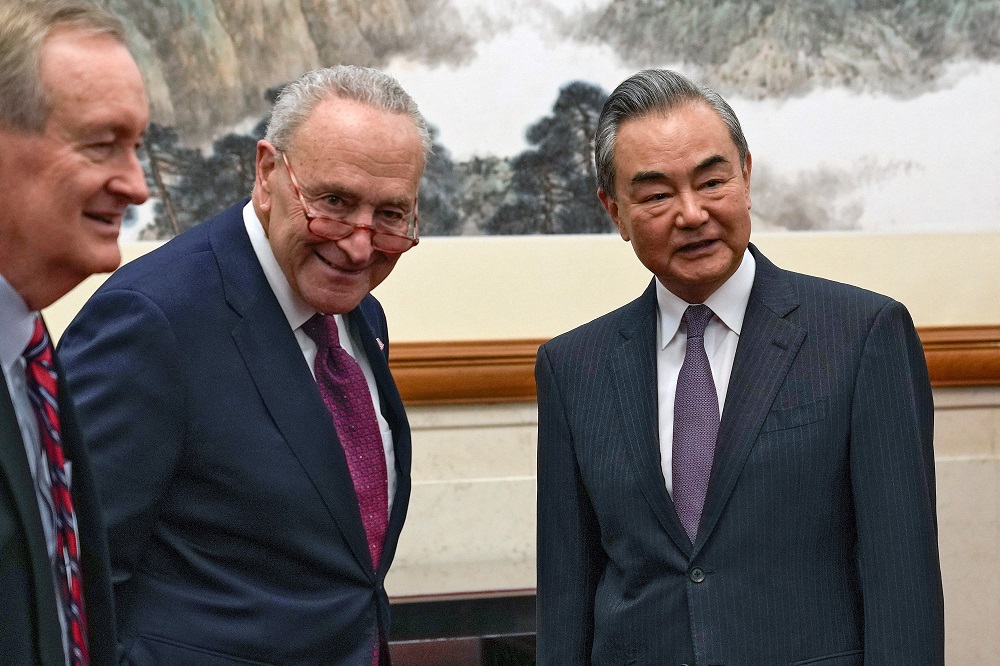
– Speaking via a letter delivered at an annual dinner of the National Committee on United States-China Relations on October 25, Chinese President Xi Jinping called for more stable bilateral ties and that establishing the “right” way of getting along would be crucial to the world.
– On October 14, U.S. Secretary of State Antony Blinken spoke on a phone call with China’s Foreign Minister Wang Yi. The pair discussed the Israel-Hamas conflict, with Wang stating: “China opposes all acts that harm civilians and condemns practices that violate international law.”
– Anonymous senior administration officials said that Wang Yi will visit Secretary of State Blinken on October 26 in a reciprocal form to Blinken’s visit earlier this month.
– California governor Gavin Newsom went on a week-long trip to China which started on October 23. Reportedly, Newsom told the Chinese people that “regardless of what happens nationally, sub-nationally, you have a partner in the state of California” on climate.
– On October 20, several Chinese diplomats attended an event hosted by the New York-based think tank Asia Society. According to Xinhua, these exchanges were aimed to improve communications and cooperation.
– The United States’ top diplomat to China, Nicholas Burns, said the Chinese government should shift their focus to Hamas, just as the U.S. has. “We do not have identical views on this particular position,” Burns said.
– In mid-October, a group of Chinese scholars from Peking University attended a three-day conference in the U.S. regarding Sino-American relations. During the event, individuals from the U.S. Department of State spoke with the scholars regarding U.S.-China relations.
– On October 12, U.S. Ambassador to China Nicholas Burns addressed a global audience at an event hosted by an American organization. “We’re back communicating, and that’s essential…We’ve got to live in peace. We’ve got to find a way to communicate,” Burns said.
Associated News References:
“China willing to cooperate with US, manage differences – Xi,” Reuters, October 24
“A top Chinese diplomat will visit Washington ahead of a possible meeting between Biden and Xi,” AP, October 24
“California governor visits China and says his state will always be a partner on climate change,” AP, October 23
“Chinese Communist Party’s diplomatic arm in ‘candid and constructive’ meeting with US think tank Asia Society,” South China Morning Post, October 20 [Paywall]
“China’s Stance on Hamas Key Point of Division, US Envoy Says,” Bloomberg, October 19 [Paywall]
“China’s Foreign Minister calls US Secretary of State on crisis in Israel and Gaza,” Reuters, October 14
“China-US relations: Chinese scholars visit Washington in attempt to spur academic exchanges and backchannel diplomacy,” South China Morning Post, October 13
“US working to stabilise China ties, envoy Nicholas Burns says while questioning Beijing’s peace efforts in Middle East, Ukraine,” South China Morning Post, October 12 [Paywall]

– On October 23, the U.S. renewed a warning that it would side with the Philippines in disputes between them and China. In a follow-up release, the Chinese foreign ministry released a press statement claiming the U.S. “disregarded the facts.”
– A Chinese citizen is currently on trial in China for accusations of spying for the United States. Chinese state broadcaster CCTV reported that the man had been working at a defense institute in 2013 and was sent to the U.S. on an academic visit, where he revealed Chinese state secrets.
– The Pentagon recently released its annual 2023 China Military Power report in which it highlighted the nuclear arsenal of the Chinese military. To supplement the report, the Pentagon also released footage of around 200 instances of intercepts of U.S. military planes by Chinese aircraft over the last two years the day before the report.
– At Stanford University in Silicon Valley, a group of intelligence leaders gathered recently to warn the private industry that China’s espionage is mostly aimed at technology companies.
– China has stated that it sent fighter jets into the Taiwan strait as a warning to US Navy airplanes also flying through the region. “Troops in the theatre are always on high alert and will resolutely defend national sovereignty and security as well as regional peace and stability,” said the Eastern Theatre Command of the People’s Liberation Army.
– A US Navy sailor pleaded guilty to charges of conspiring with a foreign intelligence officer and receiving a bribe. The sailor reportedly conspired to collect nearly $15,000 in bribes, in exchange for information, photos and videos of Naval exercises, operations and facilities.
Associated News References:
“US renews warning it will defend Philippines after incidents with Chinese vessels in South China Sea,” AP, October 23
“China says US statement on collision with Philippine boat disregards facts,” Reuters, October 23
“China says it uncovered another spying case in US,” Reuters, October 22
“Pentagon warns about China’s growing long-range missile arsenal in major report,” CNN, October 19
“Allied Spy Chiefs Warn of Chinese Espionage Targeting Tech Firms,” The New York Times, October 18 [Paywall]
“Pentagon releases footage of hundreds of ‘highly concerning’ aircraft intercepts by Chinese planes,” AP, October 17
“China says sends fighter jets to warn US Navy plane in Taiwan Strait,” Reuters, October 12
“California-based Navy sailor pleads guilty to providing sensitive military information to China,” AP, October 10

– A Taiwanese technology company, Foxconn, is currently under investigation in China for non-specific tax and land-use reasons. The founder of Foxconn is seeking the Taiwan presidency.
– Chinese investors in the U.S. have recently divested around $21.2 billion worth of sales. The move fuels speculation that China may be trying to shore up its own economy as the Chinese RMB weakens.
– The U.S. state of Arkansas recently passed legislation ordering a subsidiary of a Chinese-owned agricultural company to offload 160 acres of its land. As Arkansas governor Sarah Sanders said at a conference, “we will make sure that every company operating in Arkansas is…good to hard-working Arkansans.”
– The Biden administration and the World Bank President Ajay Banga pushed to expand the bank’s lending capacity this past year. The move occurs during a decrease in Chinese lending to the global south.
– The U.S. and the European Union have partnered in a bid to assist the building of an international railroad in Africa. China currently has a large influence in the region with its Belt and Road Initiative, which the U.S. hopes to curtail.
Associated News References:
“Apple iPhone Maker Foxconn Under Investigation by China,” The Wall Street Journal, October 23 [Paywall]
“China Sells Most US Securities in Four Years Amid Yuan Weakness,” Bloomberg, October 18 [Paywall]
“Arkansas orders Chinese company’s subsidiary to divest itself of agricultural land,” The Washington Post, October 17 [Paywall]
“A Bigger World Bank Takes on China’s Clout,” The Wall Street Journal, October 12 [Paywall]
“U.S., EU to support African railway development to counter China,” Nikkei Asia, October 11 [Paywall]

– In mid-October, Apple’s CEO Tim Cook made a surprise visit to China. The visit occurs during a slump in Apple’s popularity, as well as increasing government restrictions, in China.
– Chinese retailers have had to pull Nvidia’s top gamer graphic card from shelves as the U.S. government cracks down on exports, meaning consumers in China have to pay double the retail price to purchase the cards.
– Chinese smartphone camera producer Ofilm was a contractor for Huawei’s Mate 60 phone. The firm was formerly Apple’s supplier but dropped after the U.S. put them on a trade blacklist in 2020.
– Some Chinese battery companies that are essential to electric vehicle production are seeking joint ventures with South Korean and Moroccan partners in order to bypass U.S. restrictions.
– In Montana, Tik Tok and the state are disputing in federal over a ban on the app starting on January 1, 2024. The state aims to ban Tik Tok due to concerns over user-data privacy.
– A self-driving truck startup in China, Plus, has split its U.S. and Chinese operations into separate entities. Its U.S. company will now seek to expand globally while its Chinese side will remain domestically-focused.
Associated News References:
“Apple’s Tim Cook Makes Surprise China Visit as iPhone Sales Slump,” The Wall Street Journal, October 20 [Paywall]
“Nvidia’s Top Gamer Graphics Card Caught Up in US-China Trade War,” Bloomberg, October 19 [Paywall]
“Tech war: Ofilm, formerly blacklisted by US and dumped by Apple as supplier, is contractor for Huawei’s Mate 60 phone,” South China Morning Post, October 13 [Paywall]
“Chinese EV Suppliers Plan Side Doors Into U.S. Market,” Wall Street Journal, October 12 [Paywall]
“TikTok and content creators challenging Montana’s ban face off with the state in federal court,” AP, October 12
“Exclusive: Self-driving startup Plus splits US and China operations amid tensions,” Reuters, October 11

– The Commerce Department again expanded its export restrictions on semiconductors in China, in an attempt to stop China from gaining access to chips and manufacturing equipment.
– On October 17, the Biden administration released measures that halted the shipment of certain AI chips, in an attempt to restrict China’s access to such technologies for use in their military.
– In response, the Chinese foreign ministry countered with a statement to Reuters that “such restrictions and forced decoupling for political purposes violate the principles of the market economy and fair competition.”
– Chinese technology company Longsys has purchased a semiconductor factory from a Taiwanese firm. Many such moves reflect a trend in development of domestic Chinese semiconductor productions.
– Taiwan’s Economy Minister Wang Mei-hua announced that their corporations are still waiting on a U.S. approval for use of chip factories in China to produce U.S.-bound semiconductors.
Associated News References:
“China rebukes US over latest chip restrictions,” Reuters, October 18
“The Commerce Department updates its policies to stop China from getting advanced computer chips,” AP, October 17
“Biden cuts China off from more Nvidia chips, expands curbs to other countries,” Reuters, October 17
“Chinese storage specialist Longsys, a major client of US chip maker Micron, completes US $132 million takeover of Suzhou plant from Taiwan’s Powertech,” South China Morning Post, October 12 [Paywall]
“Taiwan says awaiting US announcement on China chip waiver extension,” Reuters, October 12

“Hong Kong to host climate change forum for US and mainland China, focusing on San Francisco Bay Area and Greater Bay Area, underscoring city’s bridge-building role,” South China Morning Post, October 23 [Paywall]
“US groups lobby to refine proposed limits on China investment,” Financial Times, October 20 [Paywall]
“Chinese-Owned Pork Producer Smithfield Prepares for U.S. Listing,” The Wall Street Journal, October 19 [Paywall]
“Reporter wins support after Nebraska governor dismissed story because the journalist is Chinese,” AP, October 19
“Nebraska governor faces backlash for comments on investigative reporter’s Chinese nationality,” AP, October 18
Stopping “Gray Rhinos”, Handling “Black Swans” and Removing “Tigers Blocking the Way”: Assessing Challenges and Exploring Prospects for U.S.-China Relations in 2024
Tuesday, October 17, 2023
Georgetown Marriott Hotel, Washington, D.C.
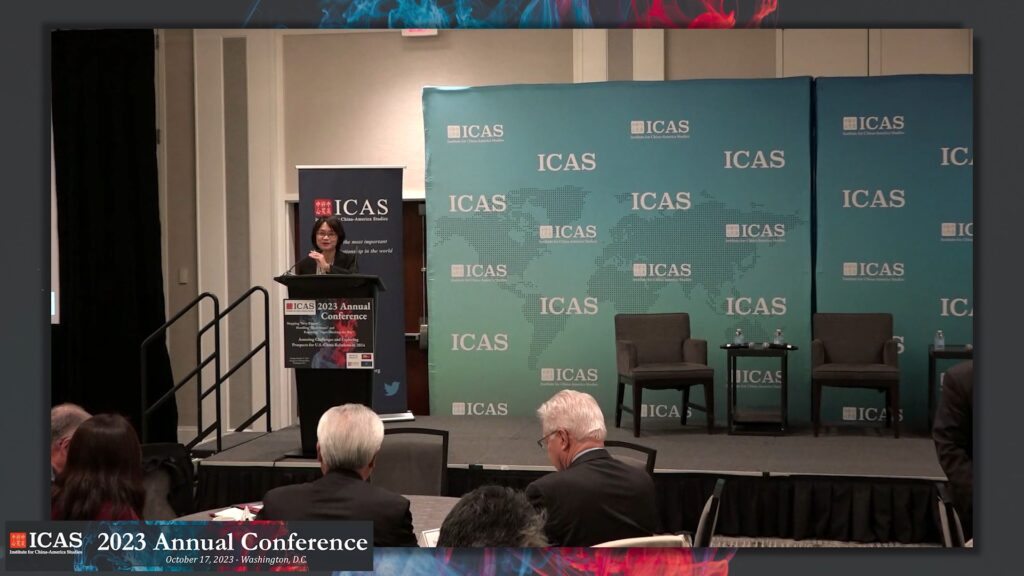
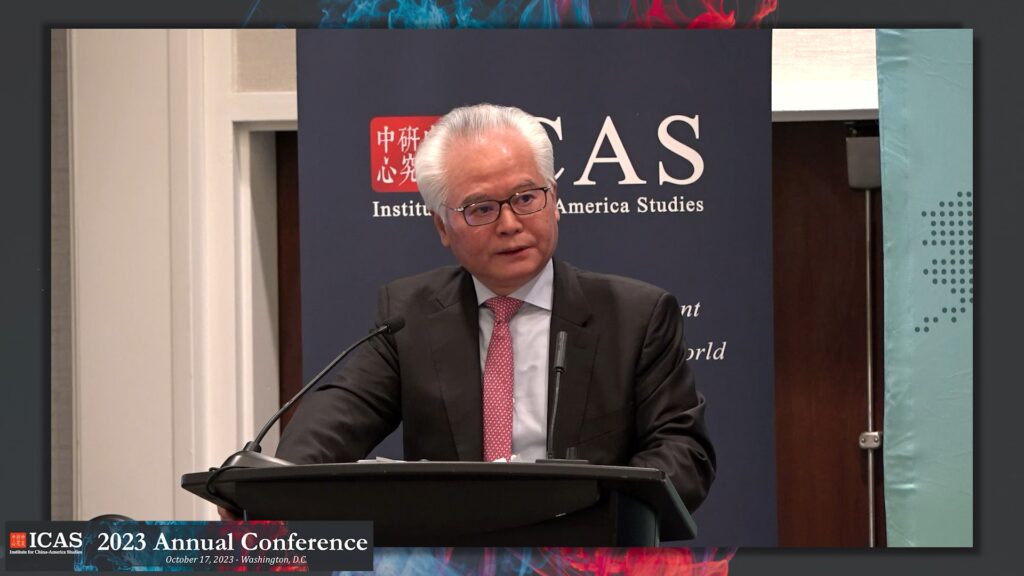
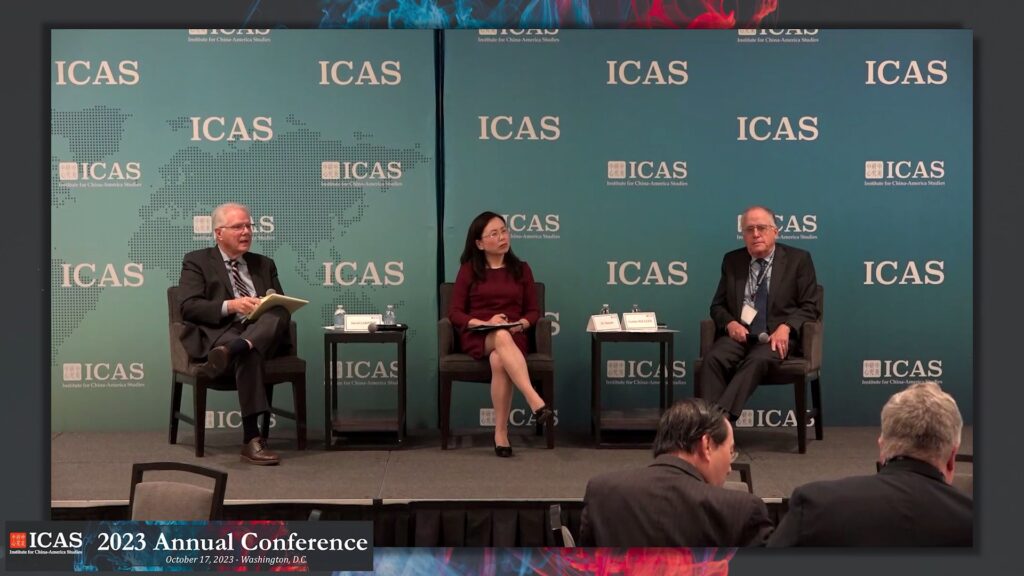
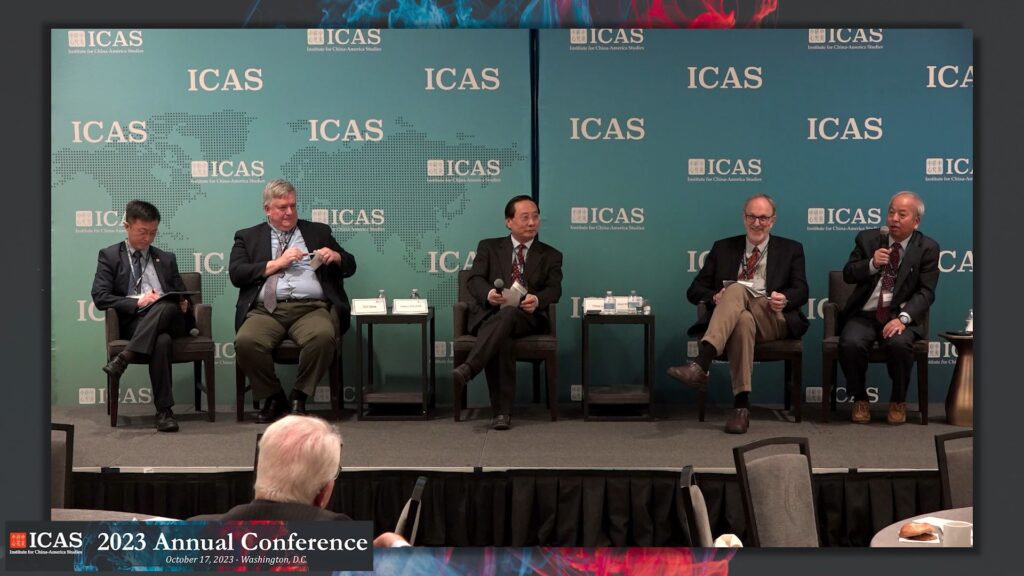
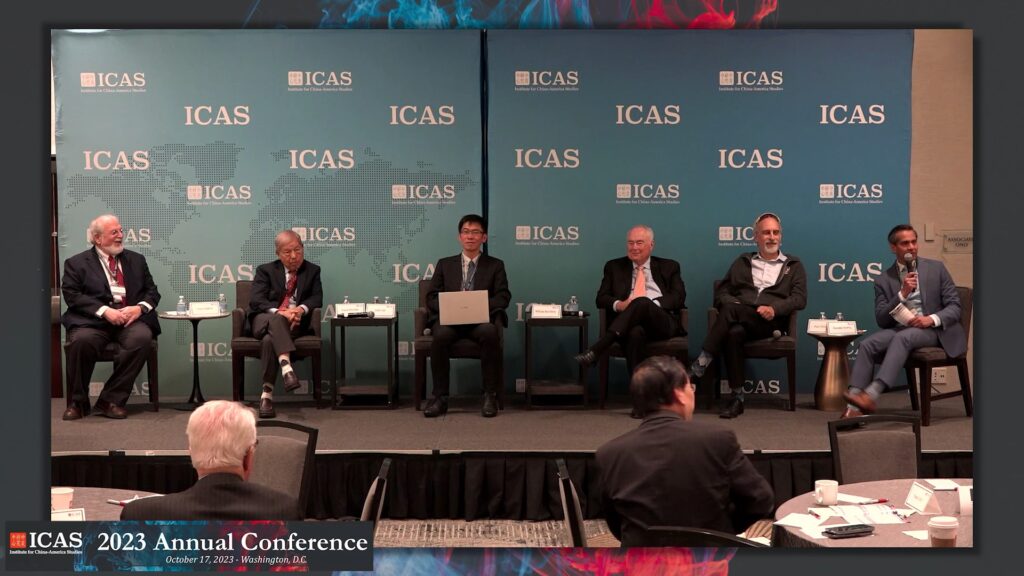
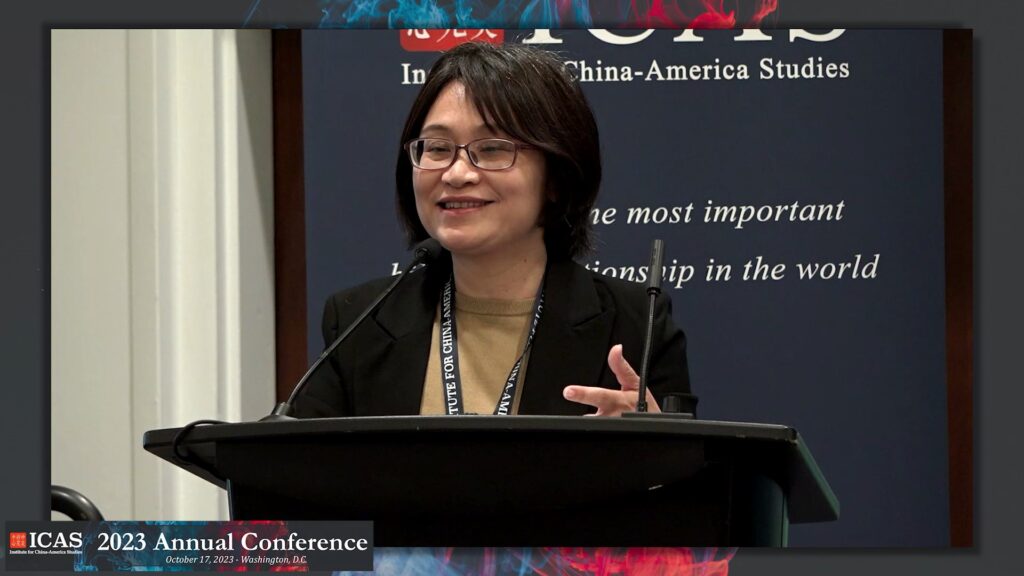
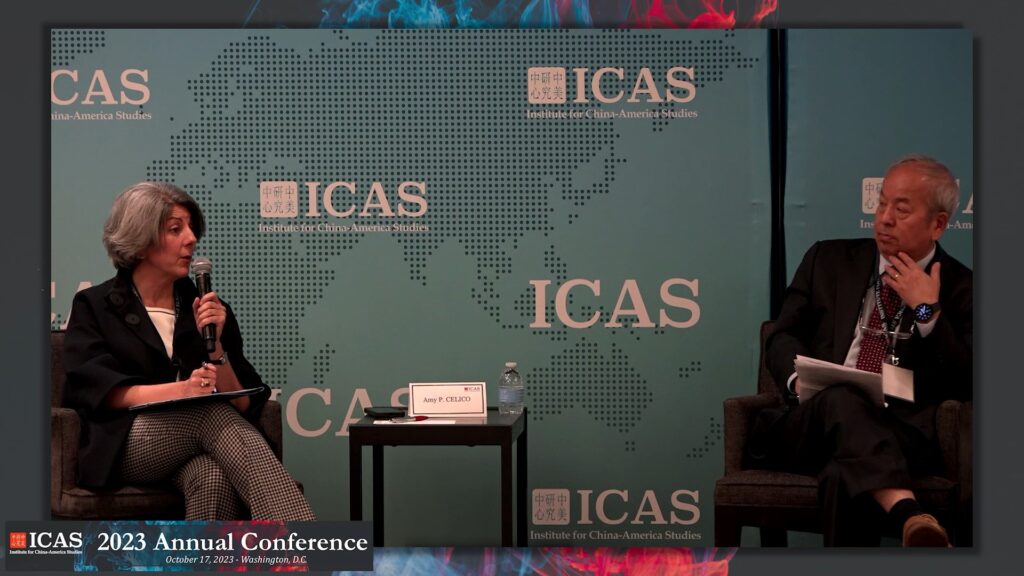
On October 17, the Institute for China-America Studies (ICAS) organized its 2023 Annual Conference. With COVID-19 thankfully more or less in the rear-view mirror, the conference was held in full, in-person format for the first time in more than four years. Dr. Hong Nong, Executive Director of ICAS, opened the conference and Dr. Wu Shicun, Chairman of ICAS’ Advisory Board, delivered the introductory remarks. In his heartfelt message, Dr. Wu spoke of the pressing need for both sides to present a forward-looking vision of ties so as to remove risks to the bilateral relationship and stabilize its long-term development. China and the United States are not fated to fall into a ‘Thucydides Trap’, and decision-makers on both sides must ensure that such a circumstance does not come to pass. Casting his own family’s experience as a typical example, Dr. Wu referred to the innumerable people-to-people ties that many Chinese share with the United States and the American people at large. Such relationships must never be decoupled, he noted, and future generations of Chinese and Americans must not pay the price of bad decisions that are taken today. Concluding, he hoped that the annual conference would throw up vibrant ideas and solutions to the many challenges being faced and articulate a new paradigm of ties that could rehabilitate and relaunch China-U.S. relations on a stable track for the next quarter century.
Keynote Dialogue
Dr. Wu’s introductory remarks was followed by the highlight of the conference—a keynote dialogue featuring Madam Xu Xueyuan, Deputy Chief of Mission & Minister at the Embassy of the People’s Republic of China in the United States, and Professor David Lampton, Professor Emeritus of China Studies at the School of Advanced International Studies, Johns Hopkins University. The dialogue was moderated by Professor Gordon Houlden, an ex-senior Canadian diplomat and Director Emeritus of the China Institute at the University of Alberta, Canada.
In her prepared remarks, Madame Xu commended the recent visit of the U.S. Senate delegation to China led by Majority Leader Chuck Schumer. She noted that, fifty years ago, President Nixon had advised U.S. Congressmen and women to travel to China to obtain an unfiltered view of the country following his own groundbreaking rapprochement visit of February 1972. Madam Xu also echoed the words of President Xi Jinping given to the visiting senators, noting that Planet Earth was vast enough to accommodate the respective development paths and common prosperity of China and the U.S. and, given the high degree of integration between the Chinese and U.S. economies and their closely entwined interests, both countries stood to benefit from each other’s development. She welcomed the visits of more U.S. congressional delegations to gain a better understanding of China’s past, present and future, and hoped that the two legislatures would have more interactions, dialogues, and exchanges to increase mutual understanding and make a positive contribution to stabilizing China-U.S. relations. Professor Lampton shared Madam Xu’s concern regarding the deteriorating perception gap between the two sides, which urgently needs to be bridged. He pointedly observed that with just approximately 350 American students in China there is no way that Sino-U.S. understanding can be successfully fostered. While he did commend the easing of tensions over the past few months at the state-to-state level, Professor Lampton cautioned that process should not be confused with progress. He furthermore pointed out four issue areas where the two sides have come to distrust each other: the Russia-Ukraine war, terrorism in the Middle East and the Israel-Hamas conflict, Taiwan and the U.S.’ ‘One China policy’, and China’s modernization drive.
During the spirited discussion phase, ably moderated by Professor Houlden, Madam Xu put forth the view that the root cause of the deterioration in bilateral relations was the misperception in the U.S. of China’s long-term strategic goals. China was not seeking to displace the United States from its position as number one or from its presence in Asia. This misperception on the U.S. side was, in turn, leading to a disrespect for China’s core interests and hampering bilateral cooperation. She noted that mutual respect for people’s choices about development paths, core interests and development rights must be at the heart of China-U.S. ties. Without disagreeing with this view, Professor Lampton noted that the onus for pulling the relationship out of its current difficulties resided at both ends, and there was a pressing need for qualitatively greater transparency from China’s side. He was pessimistic that ties could improve in the near-term, with an election year looming in America and with politics becoming increasingly difficult in both the U.S. and China.
Panel I: Cooperation, Competition and Rivalry in U.S.-China Relations
The first panel of the ICAS 2023 Annual Conference featured four senior U.S. and Chinese academic and think-tank specialists who spoke of the elements of cooperation and competition in Sino-America relations and subsequently delved into its underlying drivers of rivalry. There was a consensus among the panelists that the U.S.-China relationship is at a very difficult juncture and, despite the brief ‘window of opportunity’ that has opened up in ties, that optimism was hard to come by with regard to the foreseeable future. There was a view expressed, though, by one of the panelists that an “inevitability of peace” in U.S.-China relations would dawn in the medium-term, given that geostrategic and military peer competition would have to be confined below the nuclear threshold.
The panelists concurred that the United States and China are currently locked in a relationship that contains many pointers of intensifying great power competition. It is a harsh reality, but one which must be confronted head-on if the two sides are to avoid speaking past each other and start managing their mutual challenges better. For this to be the case, both sides need to make a markedly better effort at engendering strategic trust. Instead, at this time, both the United States and China are increasingly entrenched in their own political and ideological narrative of ‘self’ and ‘the other’ which by and large tends to be overly simplistic and self-centeredly appealing. U.S. policy on China has moved from being about competing with China to actively undermining China’s development and rise. China’s propagandistic sloganeering, its emphasis on top-down approaches to policy challenges, and its doubling down on an expanded definition of security and defense of its rights is making conflict more—not less—inevitable.
The Taiwan Question was particularly fraught with dangerous possibilities, especially with an election looming on the self-governing island. Both sides need to send very clear and credible signals to each other that their key policy positions remain on the table. The U.S. has to credibly signal that its ‘One China’ policy is not being entirely hollowed out. China must credibly signal that peaceful reunification remains on the table, and that there is no specific timeline for said reunification. Related to issues not only within the Taiwan Strait but also more broadly, the U.S. and China need to create civilian-led crisis management mechanisms. At this time, such mechanisms are more-or-less military-led on both sides, yet when a crisis arrives it will be their civilian masters—who currently lack familiarity with defusing a crisis—who will be called upon to confer and manage the crisis.
In conclusion, it was the considered view of the panelists that both the United States and China need to look beyond just doggedly pursuing their strategic interests and should explore ways to reassure the other side of their strategic intentions. The deficit in strategic trust is huge and needs addressing if the interest-based differences between the two sides are to be narrowed down. Furthermore, it is imperative that lines of communication at the senior officials’ level be restored across all issue areas. The lack of military-military exchanges, at the ministerial level and at the institutionalized senior officials’ level, is a glaring example of the strains within the relationship. Both sides would also do well to listen to Asia’s middle powers, notably South Korea and Japan, in terms of their demand for a voice and respect, in terms of their interests that they seek to protect, and in terms of their anxieties of being dragged into contingencies not of their choosing, such as a Taiwan conflict.
Panel II: Taking Stock of Selective Decoupling in U.S.-China Economic Relations
The second panel of the ICAS 2023 Annual Conference featured five specialists from academia, think tanks, and private consulting who delved into the decoupling-related dilemmas facing the U.S.-China trade and technology relationship. At its essence, for Washington, this dilemma stems from the fact that China is simultaneously the United States’ biggest customer and its greatest technological threat, from both a civil and military standpoint. Threading a solution to this dilemma would have been hard in the best of times; it is almost impossibly difficult to reckon in the strained geoeconomic and geopolitical environment of today. For China, meanwhile, the key dilemma that it faces is that the primary external ballast of its modernization strategy—an enabling international environment backed by dense Sino-American trade and technology exchanges—is shifting to its disfavor.
There was broad concurrence among the panelists that core and advanced technologies, many still dominated by the United States, reside at the center of competition in U.S.-China relations today. At the same time, China is rapidly catching up in this technology race. The great asymmetry in science and technological capabilities that used to exist a generation earlier is more-or-less being whittled down. The crux of the problem regarding the whittled-down science and technology (S&T) gap is not that there has been a drop-off in levels of creativity or institutional capacity for innovation in the United States. Rather, as a late-developer, China has a greater potential for ‘catch-up’ industrialization in the technology sphere and is increasingly making a successful play in some of these technology areas. It is this rise of China as a future technological peer with potential world-leading capabilities across a range of future intelligent systems that is instilling fear in Washington. This has subsequently prompted the U.S. to issue forth numerous rules and regulations in the tech domain that seek to “trip up,” contain, or isolate China.
An intriguing question posted by the panelists regarding the ‘extreme technology competition’ being imposed upon China by the Biden administration is whether or not the fundamental assumptions that underlie the United States’ strategy are robust. U.S. companies do not possess a ‘secret sauce,’ after all, that they have locked up and refuse to share with their Chinese counterparts, and which enables them to virtuously crank out world-beating technologies one after the other. To the contrary, they have been uniformly arguing that undercutting their commercial potential in China in the name of national security will cause long-term damage to their innovation capabilities. Besides, it is still a huge unknown as to how the private sector and markets will reconfigure global supply chains; except that one can bet that these chains will look dramatically different in ten years’ time. For its part in the meantime, the Chinese government needs to step out of the way of its private sector if the domestic economy is to grow sustainably in the years ahead. Private consumption needs to be stimulated and major fiscal reforms enacted too, given that local governments—the key contact point for the Chinese corporate sector—are starved of resources and revenues.
In conclusion, it was the considered view of the panelists that both the United States and China are still highly interdependent, and that their trade and technological drifting apart will entail high costs and pain for both sides as well as for the broader Asian and global economies. The need to arrest this drift is paramount and, in this regard, a successful negotiation and renewal of the bilateral Science & Technology Agreement (STA) would be a welcome fillip. The STA was the first agreement signed by the two sides following the normalization of ties in 1979. Its renewal and reenergizing would be an opportune gesture of confidence in bilateral S&T exchanges, especially at a time when many American public universities are hesitant to engage with their Chinese counterparts for fear of retributive actions, including loss of funding. At this time, though, the STA negotiations are proceeding fitfully, the central problem being that both sides are grappling with the difficulty of incorporating a slew of new S&T-related policy issues into a workable agreement.
Luncheon Speech
The ICAS 2023 Annual Conference was rounded off by a keynote luncheon address by Ms. Amy Celico, Partner at the Albright Stonebridge Group and an ex-senior U.S. government official in both the foreign service and international trade capacities. Ms. Celico echoed many of the points made during the earlier sessions and called on stakeholders on both sides to help steer the bilateral relationship to a more stabilizing platform. For this to be the case, both sides needed to listen to each other and not just impose their views on the other. Consultations must be real and the rhetoric coming out of Washington and Beijing must not be framed in zero-sum terms. And, if positive developments were to occur in ties, both sides must not only harvest these low hanging fruits but also publicly applaud the steps taken.
Ms. Celico’s luncheon address was spoken primarily in her capacity as a senior observer and advocate of the U.S. business community. In this capacity, she noted that the American business community’s interests are, at a fundamental level, aligned with the interests of the Chinese business community. As such, both sides need to continue advocating on behalf of the other too. It is, after all, not just the government in Beijing that is inhibiting business in China, it is American policy too. This concept is vice-versa being mirrored in Beijing. The business community on both sides also bore a responsibility to prick the bubble of ‘groupthink’ in both capitals, which tend to promote a monochromatically dark view of the other side. That said, the focus of Ms. Celico’s remarks bore on the overall tenor of the bilateral relationship and was not just confined to the business sector. Both the U.S. and China bear a responsibility to narrow the trust deficit that exists between the two sides. She emphasized that this trust deficit is not confined to the two governments alone; it pervades across both societies as well. A more considered discussion of controversial topics such as Taiwan and technology competition within each society could go a long way to lowering tensions between the two sides. With volcanic geopolitical flashpoints such as the Russia-Ukraine war and the Israel-Hamas conflict actively bubbling in plain sight, both the United States and China need to view them as an opportunity to come together to lower tensions, Ms. Celico observed, both for their own good and because both countries also have important interests at stake in these troubled corners of the world.
By Jacqueline Cheng
October 11, 2023
On October 11, 2023, the Center for Strategic and International Studies (CSIS) held a virtual event to discuss how both the U.S. and European countries are responding to and understanding ‘de-risking’ between China and foreign countries. Titled Chinese Assessments of De-risking, the goal of the event was to provide a broader perspective on issues surrounding the de-risking of both government and private entities with China. As the U.S. and European countries shift their China strategy from de-coupling to de-risking, various uncertainties plague entities operating in the China sphere…
On Tuesday, October 24, the ICAS Annual Conference & Panel II on Trade and Technology was highlighted by Hong Kong China Review News Agency (In Chinese).
On Thursday, October 18, the ICAS 2023 Annual Conference and Keynote Dialogue was discussed by South China Morning Post.
On Friday, October 20, the ICAS 2023 Annual Conference Keynote Dialogue with DCM & Minister Xu Xueyuan was detailed by the Embassy of the PRC in the USA (In Chinese).
On Thursday, October 19, the ICAS Annual Conference was detailed by Hong Kong China Review News Agency (In Chinese).
On Wednesday, October 18, the ICAS 2023 Annual Conference and Keynote Dialogue was highlighted by Nikkei Asia.
On Wednesday, October 18, the ICAS 2023 Annual Conference Keynote Dialogue was discussed by Newsweek.
On Wednesday, October 18, Senior Fellow Sourabh Gupta discussed the Third Belt and Road Forum in Beijing on CGTN America’s World Today.
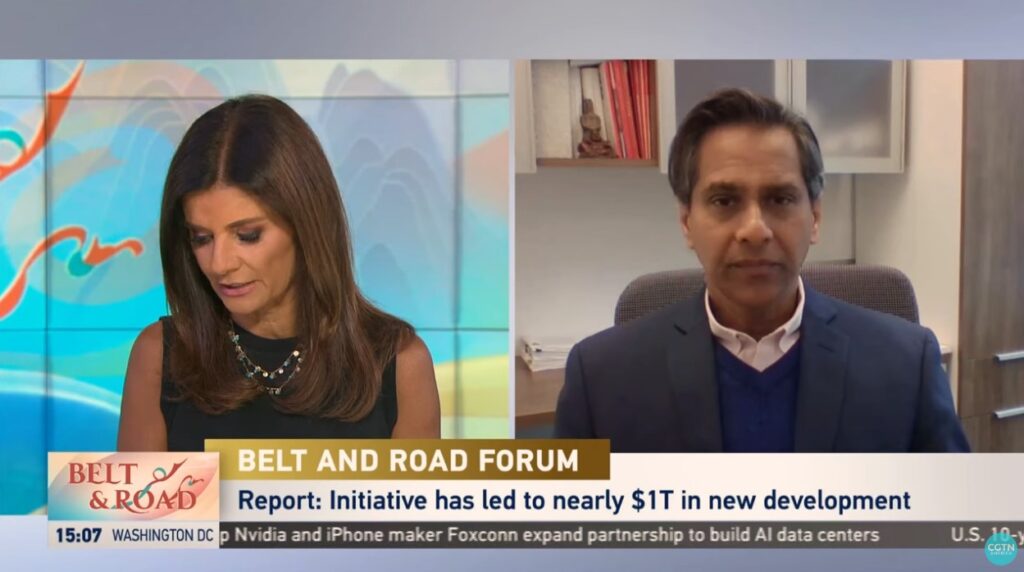

The Institute for China-America Studies is an independent nonprofit, nonpartisan research organization dedicated to strengthening the understanding of U.S.-China relations through expert analysis and practical policy solutions.
1919 M St. NW Suite 310,
Washington, DC 20036
icas@chinaus-icas.org
(202) 968-0595
© 2024 INSTITUTE FOR CHINA-AMERICA STUDIES. ALL RIGHTS RESERVED.